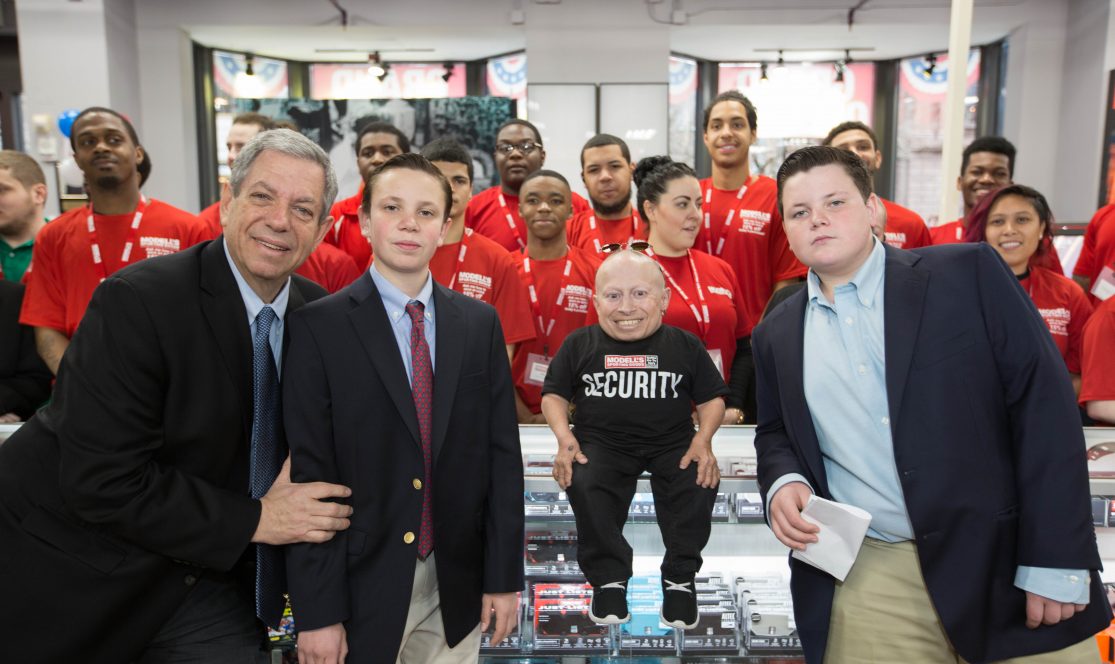Mitchell Modell has been working for the family business since he was 8 years old. Founded in 1889, Modell’s is America’s oldest family-owned sporting goods store, guided by four generations of Modells and surviving countless challenges and changes as the market evolves. Since Mitchell took the helm in 2001, he has weathered an increasingly difficult market for brick-and-mortar retailers and taken a hands-on approach to reimagining what Modell’s will look like in an e-commerce future, all the while staying true to the community-centered values that have defined and sustained the brand since its beginnings.
Did you always know you wanted to get into the family business? What was your first job?
Even as a young kid growing up in Hewlett, Long Island, I always intended to work in the family business. When I was 8, I’d follow my father and take notes for his meetings; then from ages 12 to 16, I worked in the warehouse and the stores in the summers. While I attended Boston University, I got my first job outside the company working at Filene’s Basement. My father was very clear that he wanted me to work for somebody outside the family and see the issues that associates face and what it is to work in a political structure. So after I graduated from BU in 1976, I worked at Abraham & Straus in its Brooklyn store for three-and-a-half years, first as an assistant buyer, then as a buyer in women’s coats.
What lessons have stayed with you from that early time of working for other companies?
I was able to inject new ideas and concepts. It was a great education. I put a lot of stuff into Modell’s that we didn’t have before, everything from new systems to the way we look at the business. My father’s rules were: Work a minimum of three years on the outside and get promoted once before you were allowed back in the company. As my father said, “Before you screw up our business, why don’t you go screw up someone else’s?”

Modell at the 2016 opening of his Boston store, with actor Verne Troyer and Modell’s sons, Matthew and Maxwell.
Was there a time you “screwed up”? How did you overcome the challenge?
When I was promoted to buyer for women’s outerwear at A&S, Alan Gilman, the president of the company, called all the buyers together in early February and told us, “I want the biggest Columbus Day sale in the history of the company. I’m giving everyone nine months to go out and buy merchandise. We want to drive traffic and really start off the holiday season the right way.” So I went to the owner of a company called Utex, and said, “Listen, you gotta make me look good.” He gave me a great deal on women’s coats that retailed at $200. Normally our price to Utex was $100, but he gave them to me for $50. We took the merchandise and prepared to put the ad in the paper. I was going back and forth with the advertising department making changes and being aggressive on where I wanted the ads placed. Monday morning on Columbus Day rolls around and I get there at 6 o’clock in the morning to discover a line of 300 women waiting to come in. I’m surprised by the turnout and ask them, “Why is everyone in line so early?” And they tell me, “This is the biggest sale in A&S history!” “You’re kidding,” I say. “What are you in line for, what department?” They tell me they’re here for the wool coats. And I’m thinking, I did it! It’s just unbelievable! So I say to them, “So you like the price, $99.99?” And they go, “What do you mean? It’s $9.99.” They show me the ad and sure enough, $9.99. I was put on notice and the president called me to his office and asked, “What the hell did you do?” I said, “Mr. Gilman, you wanted traffic? I got you traffic.” I survived that, but about six months later, I figured I’d got my education and went back to the family business.
Was it difficult to transition to working for the family business?
Oh yeah, you’re in a fishbowl and everyone wants you to fail. You’ve always got that title of “the boss’s son,” which I hated. You have to work harder than the next guy, come in earlier, leave later, set the example, don’t give anyone the opportunity to show them that you’re going to fail. It took probably five years. After A&S, I worked as a supervisor for our Long Island stores, and I was a little abrasive. You learn that not everyone is going to feel the same way you do about the stores, and no one is going to care as much as you do. When you’re young and inexperienced, it’s easy to rub people the wrong way. But you learn. You sit down and reflect on it, and those mistakes make you a better person as you grow up. Mistakes are good to make as long as you learn and grow from them and don’t repeat them.
Learning from mistakes was a major theme in the 2012 season premiere of Undercover Boss in which you were the featured executive. How has your experience on that show influenced your management approach?
Being on Undercover Boss was a life-changing experience. It really reinforced what we call our 48-hour policy: If someone is frustrated and they go 48 hours without getting answers or don’t like the answers from their superior, they have the right to go above that person’s head until it gets to me. We don’t have that many layers of management, so no problem should linger more than six days. But what was happening was that people were stifled: The problems weren’t coming all the way up the ladder and weren’t getting fixed. So what I discovered happening at store level was a real eye-opener. Giving people the ability to solve their problems is key.

The Boston store opening featured an array of athletes, including Shaq.
What do you believe are some of your business’ strengths?
That was a big moment, but I think mentally it was the first time where I just knew it was a success because as an entrepreneur, it finally felt like I could turn off. You go from having all these employees depending on you and making sure you don’t screw it up because you’ve got all these investors, to now, you’re part of a large corporation. You can sleep at night. There’s a massive opportunity for us to become a household name and I’m extremely motivated to continue what we started. From being an entrepreneur to finally being able to relax, knowing all you’ve worked tirelessly for since you were 16 has finally paid off is an amazing feeling. Now, my parents retired early, and I just moved them here from Maryland, and my brother is here. It’s like the American dream in a way where they brought us here, gave up everything, and now it’s my opportunity to give back.
How do you see future generations interacting with Modell’s and what are some of the changes you see in the marketplace today?
We’re a four-generation business, and we’ve gone through a lot of different business changes along the way. As we speak, we’re looking at how we can stay relevant in today’s technically demanding consumer marketplace. Brick and mortar is always going to be the mainstay, but e-commerce and the internet are definitely a huge platform for the way the younger generation operates. They don’t read newspapers or circulars, so it’s a paradigm shift on how to serve that consumer. Consumers today want it quicker and cheaper, so your business model must accommodate that. In today’s world, if you’re competing on price alone, you lose. So you have to focus on differentiation, freshness, and newness: What are the things we can carry that no one else does? Do we have private labels? Can we carry items that other businesses can’t carry, so that consumers can’t compare us on price? We hired a consultant company that’s asking us a lot of tough questions: If our business went away tomorrow, who would miss us? Would anyone care? If Starbucks went out of business, it would be a huge deal. So you have to make that emotional connection with the customer so that they trust you, and have a business model where the consumer will never allow you to go out of business. That’s the secret sauce every successful business needs to figure out.














































